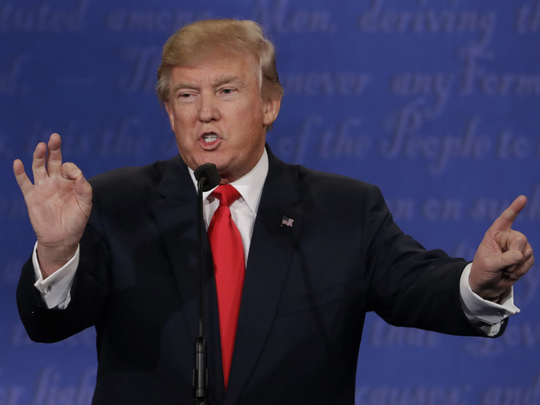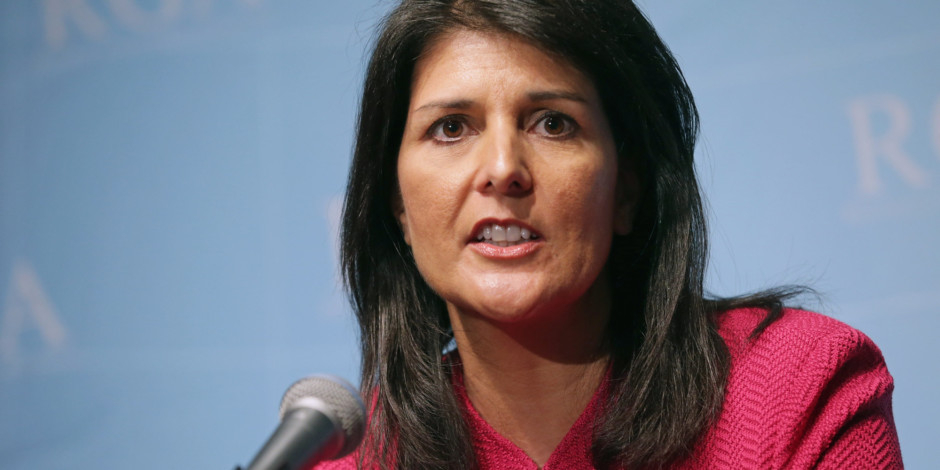
When President-elect Donald Trump picked Governor Nikki Haley, a Republican from South Carolina, to be the next US Ambassador to the United Nations, many were incredulous not because Haley, if and when confirmed by the Senate, will become the first US cabinet member of Indian ancestry, but because she was highly critical of candidate Trump.
As an outspoken supporter of Israel, however, she fit in nicely with Trump’s unabashed pro-Israel position and was the first governor to enact laws that combat the anti-Israel boycott, divestment, and sanction movement, which ban corporations from doing business with any company that is participating in a boycott “based on race, colour, religion, gender or national origin of the targeted person or entity.”
How will Haley fare at the United Nations and will she succeed in defending US interests?
There are, of course, many pending concerns that preoccupy the international community though a few stand-out for sheer urgency. One is the relationship between the five permanent Security Council members and though Trump and Russian President Vladimir Putin may make many deals in the months to come, Paris, London and Beijing will need to be reckoned with on a slew of items ranging from global warming to various humanitarian issues.
The other two major contentions are Iran and Syria, which will take-up a lot of Haley’s time as she will be Trump’s international mouthpiece, especially if the White House embarks on aggressive policies against Tehran. Trump advisers, including retired Lieutenant-General Michael Flynn as national security adviser, Stephen Bannon as strategic counsellor, Representative Mike Pompeo as CIA Director, and Senator Jeff Sessions as Attorney-General, have all expressed hateful rhetoric about Muslims in general and Iranians in particular, which will hard sells at the world body.
While the President-elect told CNN in March 2016 “I think Islam hates us,” Flynn has called the faith of 1.5 billion believers “a cancer” and in a July 2016 tweet wrote that he “dare[s]” Muslim world leaders to “declare their Islamic ideology sick.”
In February 2016, Flynn tweeted a link to a YouTube video titled “Fear of Muslims is RATIONAL,” which highlighted his state of mind.
Bannon, who ran a conservative news outlet, promoted a nationalist line that portrayed Muslims as a dire threat to the US while Frank Gaffney, under consideration for a high-ranking Department of Defence position, warned of “an Islamist Fifth Column operating inside our own country.”
Pompeo, a vocal critic of the Obama Administration’s security policy, opined: “Muslim leaders across the US who fail to condemn terror attacks motivated by radical Islamic beliefs are potentially complicit in these acts, and more importantly still, in those that may well follow.”
The next Attorney-General’s supporters believed that the Sessions appointment would now end what “Attorney-General Loretta Lynch” allegedly did, which is to be “more concerned about protecting Muslims from criticism than they are about Muslim crimes and Islamic terrorism.”
Trump’s choice as deputy national security adviser, FOX News analyst Kathleen T. McFarland, has even accused the Obama Administration of enabling Iran to get nuclear weapons, which did not bode well for Iran as the chance of an American war against Iran grows by the day.
Deal-maker
Haley will now need to navigate through all of these personalities and, presumably, defend the issues they will address at the UN. She runs the risk, like former Secretary of State Colin Powell — who was displayed at the UN to justify a US-led attack on Iraq in 2003 (and never recovered from that debacle) — to wallow in contradictions, though she will need to find the courage to balance pending national security disasters with America’s global commitments, including with India. The latter is critical because she could, potentially, be asked to “make a deal” with Delhi over Iran, something that will not go down well.
Haley’s parents, Ajit Singh and Raj Randhawa, are from Amritsar in the north-western Indian state of Punjab and though the Governor is a die-hard Republican who can rely on the vast conservative machinery in place to protect her, she will need to defend potential Trump adventures to Indian leaders. In short, she will be asked to make deals, as the President-elect said when he appointed her, insisting that she is a “proven dealmaker... and we look to be making plenty of deals.”
In fact, Trump and his close associates were impressed by Haley when she replied to the 2016 Obama State of the Union address, when she criticised the president over the way Israel was allegedly treated by his administration and pledged that it would be different under Republicans.
Obama turned out to be manna from heaven to Israel, and while former President Jimmy Carter recently called on him to recognise the State of Palestine before he left office as a way to salvage something of his tarnished reputation, Obama gifted Israel billions of dollars in military and commercial aid, topped by a $38 billion (Dh139.58 billion) bonanza last September. Haley’s assessment, therefore, was pure politics devoid of value, but that’s what the times require.
Remarkably, in January 2016 she promised that Republicans “would make international agreements that were celebrated in Israel and protested in Iran, not the other way around,” which Trump’s anti-Muslim and anti-Iranian steps will now stretch her deal-making capabilities to the limit.
Beyond Iran, Haley will also need to master the Syria file at the UN that, no matter ongoing confrontations in Aleppo, still rests on a potential division of that country to satisfy Israel’s quest for minority rule throughout the Middle East.
In his November 22 interview with the New York Times, Trump declared that “We have to end that craziness that’s going on in Syria,” and claimed that he had some “very definitive” and “strong ideas” about how to deal with the civil war in Syria without elaborating.
A few weeks earlier, he told the Wall Street Journal that he would focus more closely on fighting extremists rather than on ousting Syrian President Bashar Al Assad and, given Putin’s support for Assad, ruled out military intervention there. Exactly what Obama did since 2011.
Whether Trump/Haley can make deals with Putin and others over Iran, Syria and so many other sensitive matters that preoccupy the international community is open for debate, though few should be surprised that the going will be extremely difficult. Better be ready for major swings even if these deals will mostly be of the ephemeral variety.
Dr Kechichian is the author of the just published From Alliance to Union: Challenges Facing Gulf Cooperation Council States in the Twenty-First Century (Sussex: 2016).













